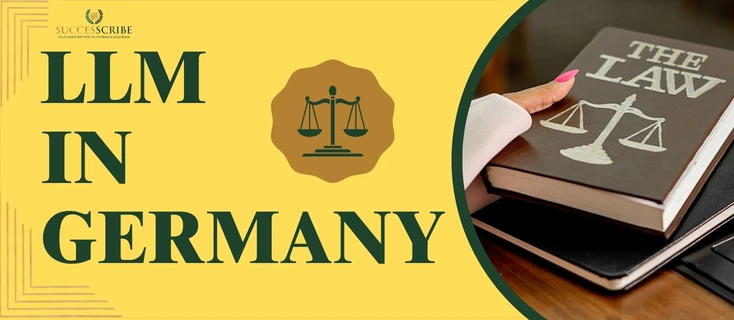Germany is one of the countries with the world’s best higher education system. Advanced legal studies students have been increasingly interested in pursuing their Master of Laws, also referred to as an LLM in Germany. In this global and multicultural setting, international students can now explore specialized areas of law. Known for rigorous standards in academia, emphasis on research, and practical training, German law study prepares students to be very rewarding and in high demand worldwide. Below is the guide covering top universities offering LLM, the application process, job prospects, career opportunities, and cost of study, among other insights.
Why LLM in Germany?
Quality education at affordable prices and diversity in cultural experiences make Germany a desirable destination for legal studies. The reasons to study LLM in Germany are:
- World-Class Education: The law at German universities has an excellent global reputation, and many have research centers in specialized legal fields.
- Specialization: Germany’s legal programs cover many niches, including international law, business law, and human rights, allowing students to specialize in high-demand fields.
- Access to the European Market: German university graduates are well-placed for jobs within the EU because of the high demand for legal expertise in European and international regulations.
- Low Tuition Fees: LLM programs in Germany are relatively cheap compared to other countries. Public institutions offer very cheap tuition fees.
Best LLM Universities in Germany
Many German elite universities offer LLM degrees, each specializing in some areas of legal study. Here are a few:
University of Heidelberg
University of Heidelberg specializes on research and international law; it offers LLM courses in the areas of international human rights, public international law, and European business law.
Situated right at the heart of the capital in Germany, Humboldt University possesses a robust law faculty whose thrust and focus is toward European and international law. It thus places its students under a very effective setting where one is able to develop both connections and internship positions in their field of practice.
Ludwig Maximilian University Munich (LMU Munich)
LMU Munich has been among Germany’s most ancient and most esteemed institutions for higher learning. LLM programs provided for in the curriculum are concentrated around the areas of comparative law, European law, and corporate law.
University of Hamburg
The University of Hamburg offers a good balance between students interested in international business law and comparative law, which collaborates closely with the Max Planck Institute for Comparative and International Private Law.
Bucerius Law School
Bucerius Law School is Germany’s first private law school, which specializes in the LLM in International Business Law. They offer various exchange programs and have an exceptionally strong international network.
Freie Universität Berlin
It is known for courses on international law, focusing on those concerning human rights, environmental law, and European law.
Related Post: Top German universities for international students
Application to LLM in Germany
Application for LLM in Germany involves the following procedures. From the course selection up to meeting some criteria, this is how one may do it:
Select a Course and Specialization
Specializations for LLM programs vary between German universities, so make sure you pick the best program to help you achieve your professional goals. Some specializations may be in International Law, European Business Law, or Intellectual Property Law, and others could be niche like Environmental Law.
Check Eligibility Requirements
Most LLM programs require a bachelor’s degree in law or in a related field. Sometimes, programs may require work experience, especially in practical or specialized fields.
Language Requirements
Many LLM programs in Germany are taught in English, but some will require proficiency in German. For the English-taught programs, an international student is required to have at least an IELTS score of 6.5 or higher or equivalent TOEFL scores.
For programs in German, the requirement is that a candidate be proficient in German, typically B2 or C1 level.
Required Documents
Some of the common required documents include:
- Transcripts from previous institutions
- A valid passport
- APS
- Language proficiency (IELTS, TOEFL, or TestDaF for German)
- Letters of recommendation
- Statement of Purpose (SOP) explaining why you want to do the LLM
Application Deadlines and Fees
These vary from university to university. Applications for the fall intake are usually submitted between May and July, while for the spring intake (if available), they are usually submitted between December and February. Application fees vary but range between €50-€100.
Cost of LLM Course in Germany
Germany is known for having free universities or low-fee international universities. Private universities cost money, especially for highly specialized LLM programs.
- Public Universities: Administrative fees or student union fees and transportation are usually around €200-€300 per semester
- Private Universities: The universities may charge anywhere from €10,000 to €20,000 for LLM programs, especially for highly specialized business law or specialization tracks.
- Cost of Living: Depending upon the city, German students can spend approximately around €800–€1,200 a month just on monthly living expenses, which mainly include rent, food, health insurance and transport.
For covering some amount, there are specific scholarships provided for students going for Germany study. DAAD Scholarship, Deutschlandstipendium, and Erasmus+ support international students during the Germany LLM education journey.
Scholarships for LLM Students in Germany
Germany has various scholarships designed specifically for international students who intend to study an LLM. Some of the scholarships are:
1. DAAD Scholarship
The scholarship is provided by DAAD, which is an abbreviation of the German Academic Exchange Service. It supports students in the world with monthly allowance and travel expenses and sometimes tuition fees.
2. Deutschlandstipendium
Scholarships are offered in various German universities covering a sum of €300 monthly for talented students of all nationalities.
3. Erasmus+ Program
Erasmus+ is one of the EU scholarship programs that finance students studying masters all over the universities of Europe, including Germany.
Job Prospects and Career Opportunities

The LLM that one would acquire in Germany would present a good employment opportunity for both Germany and all of Europe and indeed elsewhere in the world. This is a list of employment opportunities after acquiring the German LLM:
Company Attorney
The booming business and finance sectors offer lawyers corporate, tax, or commercial law expertise in Germany’s top firms or multinationals.
Compliance Officer
LLM graduates specific to compliance can lead toward jobs as compliance officers working to ensure that organizations carry out activities strictly in observance of legislation. With the boom in the respective fields, it is about to happen in Germany as well as Europe, especially finance and health sectors.
International Organizations
After specializing in international law, those interested can work with places such as the UN or with organizations like the World Bank or European Union, with which Germany shares a strategic status as a hub for several institutions.
Academics and Research
An LLM can also lead someone into an academic career working in teaching or research opportunities in law. Germany, as a country, comprises several research institutions and university bodies that value expertise over several legal fields.
Legal Consultant or Advisor
They also have consulting roles in intellectual property law, environmental law, and international trade law. Indeed, they are the people most of the law firms and businesses seek to hire as consultants.
German Legal Market and Employment Trends
The German legal employment market is highly competitive and, in particular for corporate law and international law. Since law firms require applicants with knowledge of the region, knowledge of the official language, and experience in European or international law, most firms offer internships and part-time positions; LLM students will be able to secure work and experience during their course.
Visa Application Process for International Students
For any international student wishing to attend a German university, there is a requirement for a student visa. Typically you will need the following:
- Letter of Acceptance by the German University
This acceptance letter must be done as a condition of processing for visa.
- Duly documented Evidence of means of finance
There is evidence that each student has the minimum €11,208 per year equivalent to approximately €934 a month that can help take care of him. Most of them put the same in the blocked account
- Health insurance
This is a statutory requirement, especially in Germany. They will require adequate health cover at least to cover them while in university for their stipulated period.
- German language Skills (if any)
If you choose to attend a German course, then you will possibly be required to prove suitable German language skills through recognized test forms like TestDaF or DSH.
Conclusion
Pursuing an LLM in Germany offers students from all over the globe an affordable, high-class education in law with room for specialization in a field relevant to the globe. Law programs in Germany-from elite universities to an application process favoring academic excellence-entail a robust foundation of an international legal career. With hands-on experience as well as multiple routes, opportunities for further extension of law experts in the context of the European and International environment offer Germany as a prime location.
Related Post
Digital marketing degree in Germany
Highest paying companies in Germany
Top low cost universities in Germany
How to learn German language in India











